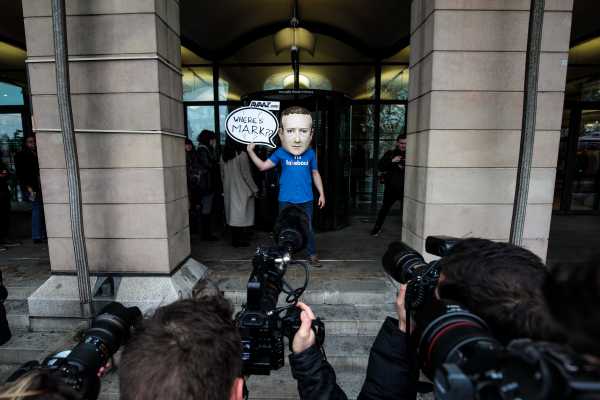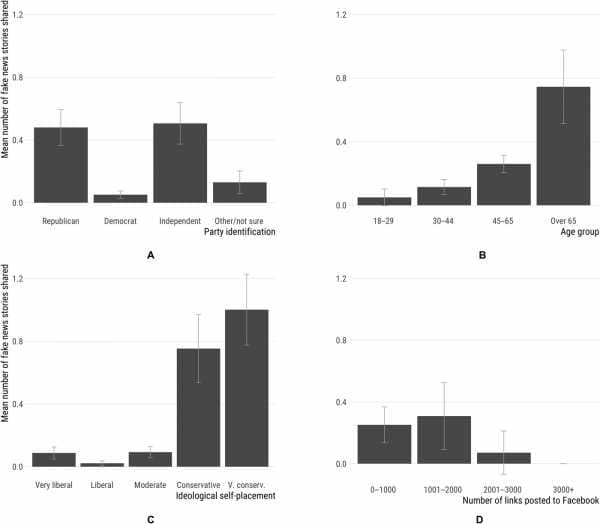
If it feels like your Great Aunt Susan was sharing more fake news on Facebook during the 2016 election than any of your other friends, it’s because she probably was, according to a new study.
Conservatives and people over the age of 65 were disproportionately likely to share articles from fake news domains during the last presidential election, researchers from Princeton University and New York University found in a recent study, the results of which were published in Science Advances this week.
The conservative part is perhaps unsurprising, given that so many fake news sites were pro-Donald Trump. But the age part, not so much: Researchers found that regardless of ideology, Facebook users age 65 and older shared almost seven times as many fake news articles as younger users. In other words, blame the baby boomers.
“The striking thing for us was that the association with age holds even when accounting for ideology or party. It seemed to be independent of political affiliation or political lean,” Andrew Guess, a professor of politics and public affairs at Princeton and one of the researchers behind the study, told me.
Fake news wasn’t all over Facebook in 2016. But when it was, it was likely to be baby boomers spreading it.
The researchers found that the vast majority of users didn’t share fake news during the 2016 election — only 8.5 percent of the users studied shared at least one link from a fake news site. But 18 percent of Republicans shared fake news, compared to under 4 percent of Democrats. Independents shared about as much fake news as Republicans, and users who identified themselves as “very conservative” shared the most fake news.
When ideology was scrapped and the study just focused on age, they found that older users were much likelier to share fake news. The over-65 group shared almost seven times as many fake news articles on Facebook than users ages 30 to 44, and more than two times as much as users ages 45 to 65.
“Until now, it’s been an anecdotal series of observations about your crazy aunt, and this is one of those cases where the data actually do back up what people suspect,” Guess said.

What the study doesn’t identify is why older people, in particular, seemed more susceptible to fake news. People who shared the most content on Facebook were actually less likely to share fake news than their friends, suggesting those people were more familiar with what they were looking at on Facebook and therefore had an easier time distinguishing fake and real news.
The researchers suggested that there might be an issue with media literacy, though more investigation is needed. But basically, it could be the case that older Americans don’t have the digital media savvy necessary to critically view and determine the trustworthiness of the content they see on social media platforms. And as more Americans age, and older people get online, the problem could get worse.
According to Pew Research Center, 41 percent of Americans age 65 and older are on Facebook. That proportion is growing and is likely to keep doing so — meaning the fake news problem among older users could get worse.
“There’s an intersection between a huge cohort of people entering retirement at a time when there’s massive technological change in the media landscape, and we don’t know what that’s going to produce,” Guess said.
Older people are often the target of scams, whether by mail, telemarketing, phone, or a variety of other means. Technology has exacerbated the problem, with the Department of Justice in 2017 tallying up scams that cost seniors more than $500 million.
There’s still a ton we don’t know about fake news on Facebook
Facebook is far from having a complete solution to its fake news problem, and while it has made efforts to improve its vetting processes and shut down dozens of accounts, it still has quite a way to go. Just last week, an article claiming that House Speaker Nancy Pelosi had agreed to build Trump’s border wall in exchange for a gun ban swept across Facebook, getting much more engagement than an article debunking the story.
It’s also still unclear how big a role fake news played in swaying the 2016 election. At least one study last year suggested that fake news played a role in depressing support for Hillary Clinton.
There is also the question of how much of an incentive there is for Facebook to seriously address its fake news problem. Facebook wants engagement, and fake news, like it or not, can help drive it — according to this latest study, perhaps especially among an age demographic where it has a lot of room for growth.
Sourse: vox.com






